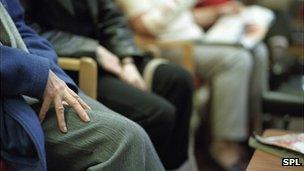A&E crisis plans 'not good enough', MPs say
- Published
- comments

Pressures have been growing on A&E units for a number of years
Plans put in place to relieve the pressure on A&E units in England are not good enough, MPs have warned.
The Health Select Committee said it had been given "confusing" and "contradictory" information about what was being done.
It prompted the cross-party group to question how prepared the NHS would be for next winter.
NHS England said it was considering various measures to take pressure off A&E units ahead of the cold season.
The MPs said staffing issues and rising attendances were among the main causes of the problems.
Their evidence found just 17% of hospitals had the recommended level of consultant cover, while difficulties with discharging patients and a lack of beds at times meant the flow of patients through the system was disrupted.
The report comes after the NHS missed its four-hour waiting-time target in the first three months of this year.
'Flying blind'
In the long-term, the MPs urged NHS England's medical director Prof Sir Bruce Keogh, who is leading a review of urgent and emergency care, to look at the weaknesses across the rest of the health service.
They said there was much more the primary care system, which includes GPs, urgent care centres and minor injury units, could do to prevent unnecessary visits to A&E.
The MPs also suggested ambulances could treat more patients at the scene to reduce the number of transfers to hospital, while the new 111 non-emergency phone number needed to get better at offering advice.
Earlier this year NHS England announced urgent care boards would be created to form action plans and release money to combat the difficulties being faced.
But in the evidence sessions with senior people in the health service, the MPs were left unclear whether they were voluntary or compulsory, temporary or permanent.
The MPs also highlighted differences in data they had been given about the scale of the problems, with vastly different impressions given of delayed discharges from hospital and the increases seen in attendances at A&E.
Committee chairman Stephen Dorrell said: "The system is 'flying blind' without adequate information about the nature of the demand being placed upon it."
He said all parts of the NHS - including social care, GPs, ambulance trusts and the 111 phone line - needed to have a plan place by the end of September to ensure they were ready for the winter peak.
"The committee is mindful of pressures which will build and is concerned that current plans lack sufficient urgency," he said.
Labour's shadow health secretary Andy Burnham said A&E departments were "routinely working below safe levels" because of inadequate staffing.
He said almost 5,000 nursing posts had been cut since the 2010 election and accused the government of taking "unacceptable risks with patient care".
"[David] Cameron must act on this report without delay if this coming winter is not to turn out even worse than the last," he said.
Patients Association chief executive Katherine Murphy said: "How much more evidence does the government and NHS England need before they take notice?
"The system is under increasing pressure and is coming apart at the seams. The time to act is now."
An NHS England spokesman said it recognised there was work to be done and action plans would be in place by the autumn.
"The committee has raised some key issues," he added.
Dame Barbara Hakin, deputy chief executive of NHS England, said the organisation was "looking at a range of things that will take the pressure off our A&E departments", including supporting more patients at home and making sure people are discharged from hospital as soon as they are ready.
She said experts from across the health service were discussing how to improve care, especially for the growing number of elderly patients, in time for the winter.
- Published24 July 2013
- Published2 July 2013
- Published4 June 2013
- Published4 June 2013
- Published23 May 2013
- Published15 May 2013
- Published15 May 2013